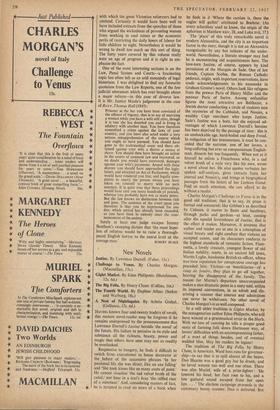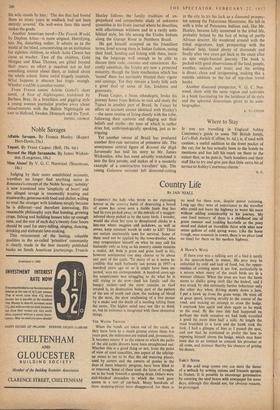• New Novels
Justine. By Lawrence Durrell. (Faber, 15s.)
Challenge to Venus. By Charles Morgan. (Macmillan, 15s.) The Big Fella. By Henry Clune. (Collins, 16s.) A Nest of Nightingales. By Arlette Grebel.. (Gollancz, 12s. 6d.) HAVING known four-and-twenty leaders of revolt, this mature novel-reader may be forgiven if he remains unimpressed by the pronouncement that LaWrence Durrell's Justine heralds 'the novel' of the future. His failure to perceive in its style and substance all the richness, beauty, power and magic that others have seen may not so readily be overlooked.
Responsive to imagery, he finds it difficult to switch from executioner to house decorator at the behest of the successive phrases 'In her passional life she was direct, like an axe falling' and 'She took kisses like so many coats of paint.' He cannot visualise 'the sad velvet broth of the canal,' nor hear in a taxi's bray `the stifled roar of a minotaur.' And, considering matters of fact, he is tempted to read no more of a book when
he finds in it 'Where the carrion is, there the eagles will gather' attributed to Boehme. (As every schoolboy used to know, the origin of the aphorism is Matthew xxiv, 28, and Luke xvii, 37.)
The 'place' of this truly remarkable novel is modern Alexandria, and the city is an important factor in the story, though it is not an Alexandria recognisable by any but initiates of the under- world. Nevertheless, a literate stranger may feel he is encountering old acquaintances here. The love-torn Justine, of course, appears by kind permission of the Marquis de Sade. One of her friends, Captain Scobie, the Roman Catholic pederast, might, with important reservations, have made acknowledgements to his namesake in Graham Greene's novel. Others look like refugees from the prewar Paris of Henry Miller and the postwar Paris of Sartre. Among unfamiliar figures the most attractive are Balthazar, a Jewish doctor conducting a circle of students into the mysteries of the Cabbalah, and Nessim, a wealthy Copt merchant who keeps Justine. Sade's Justine was a bore, but she enjoyed ad- vantages of which Lawrence Durrell's heroine has been deprived by the passage of time : this is an unshockable age, hard-boiled and deep Freud. In mitigation of her tiresomeness, it must be con- ceded that the narrator, one of her lovers, a long-suffering but ever so compassionate English- man, dissects her too frequently. When not at it himself he enlists a Frenchman who, in a sad velvet broth of a style very like his own, wrote a novel about her. He also quotes verbatim her spoken self-analysis, gives extracts from her journal and Nessim's, and brings in biographical passages from the letters of her Lesbian friend. Paid so much attention, she can afford to do without a reader.
Charles Morgan's Challenge to Venus is in the good old tradition; that is to say, its prose is formal and measured; like Gibbon's as described by Colman, it moves to flutes and hautboys, through parks and gardens—at least, coming after the squalid feverishness of Justine, that is the effect it makes. Moreover, it assumes that author and reader are at one in a conception of visual beauty and right conduct that violates no accepted canon, and its characters conform to the highest standards of romantic fiction. Fiam- metta, a lovely creature, youngest flower of old Italian nobility, meets, in an ancient hill town, Martin Lyghe, handsome British ex-officer, whose war-time reputation for conspicuous courage has preceded him. Victims—or beneficiaries—of a coup de foudre, they plan to go off together, braving the disapproval of the family. The reason for Martin's departure unaccompanied makes a nice dramatic point in a story told, within its imposed conventions, in so adroit and dis- arming a manner that interest and admiration can never be withdrawn. No other novel of Charles Morgan's is so well composed.
In a still older tradition is Giglet Market, by the nonagenarian author Eden Phillpotts, who will have winced at a grammatical error in the blurb. With no loss of cunning he tells a proper good story of farming folk down Dartmoor way, of lovers' difficulties with an uncompromising father, of a mort of things besides, and of eventual wedded bliss. May his readers be legion !
The tradition of The Big Fella, by Henry. Clune, is American. Ward boss runs for governor- ship—to say that is to spill almost all the beans. Dan Hearne was a good guy but he drank, and he loved women too well and too often. There was also Muriel, wife of a prize-fighter : 'He lowered his head; her face rose to his, and a low guttural sound escaped from her open lips. . . .' The election campaign proceeds in the customary boozy manner. Dan is defeated. But
his wife stands by him : 'The ties that had bound them so many years in wedlock had not been entirely severed.' On well-worn lines this novel makes the grade.
Another American novel—The Fourth World, by Daphne Athas—is more original. Horrifying, too. No, disturbing rather. It admits us to the world of the blind, concentrating on an institution for sightless children, to which Actia dlewes has come as teacher. Two of the children, Gobi Morgan and Rhea Thomas, are gifted beyond their years; an effort is required not to feel something sinister about them, or indeed about the whole school. Some awful tragedy impends. What happens is obscure but tragic enough. Whether credible is another matter.
From France comes Arlette Grebel's short novel, A Nest of Nightingales, translated by Barbara Bray. In a breathless and giggling style a young woman journalist prattles away about misadventures with the Ballets Nightingale on tour in Holland, Sweden, Denmark and the Tyrol.
DANIEL GEORGE











































 Previous page
Previous page